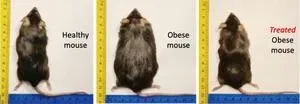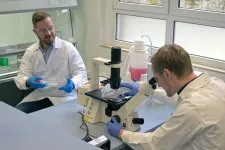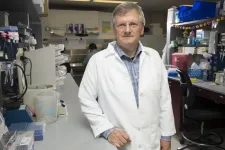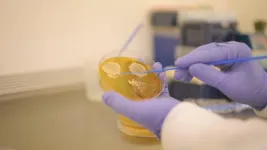(Press-News.org)
A University of Massachusetts Amherst biomedical engineer has used a nanogel-based carrier designed in his lab to deliver a drug exclusively to the liver of obese mice, effectively reversing their diet-induced disease.
“The treated mice completely lost their gained weight, and we did not see any untoward side effects,” says S. Thai Thayumanavan, distinguished professor of chemistry and biomedical engineering. “Considering 100 million Americans have obesity and related cardiometabolic disorders, we became pretty excited about this work.”
Efforts to translate these findings to humans are being pursued by a start-up company Cyta Therapeutics, which was founded at the UMass Institute for Applied Life Sciences (IALS) based on the nanogel technologies from the Thayumanavan lab. In late July, Cyta Therapeutics won the Judges’ Choice Best Startup at the 16th annual Massachusetts Life Sciences Innovation (MALSI) Day in Boston.
“There is a significant amount of development work to be conducted between mice and humans,” Thayumanavan says, “but we are hoping it will eventually become a drug.”
Senior author Thayumanavan, director of the Center for Bioactive Delivery at IALS, explains his team’s findings in a paper published Tuesday, Aug. 29, in the Proceedings of the National Academy of Sciences NEXUS. Ruiling Wu, doing research for her Ph.D. in chemistry in Thayumanavan’s lab and at the Center for Bioactive Delivery, is the paper’s lead author. Wu recently graduated and now works for a pharmaceutical company in Boston.
One of the center’s primary goals is figuring out how to get the right drug to the right place in the body by creating novel delivery platforms for small and large molecules.
Thyromimetics, or drugs that mimic synthetic thyroid hormone, have been considered as a potential way to tackle the problem of obesity, type 2 diabetes, high cholesterol, metabolic dysfunction-associated steatohepatitis (MASH) and other metabolic conditions. Targeted therapy is key, however. Thayumanavan and his team looked at one such thyromimetic.
“We realized we needed to deliver this drug selectively to the liver because if it goes to other places, it could cause complications,” he says. In addition to side effects, taking the drug systemically was expected to dilute its effectiveness, which was confirmed in the study.
Thayumanavan and team fed a group of mice a high-fat, high-sugar, high-cholesterol diet for 10 weeks, doubling their weight. A control group of mice were fed a healthy diet.
“We came up with a very simple approach, using our unique invention – nanogels that we can direct selectively to different targets, which we call IntelliGels,” Thayumanavan says. “They were custom-designed for hepatocyte delivery in the liver.”
The obese mice were given the drug daily, packaged inside the nanogel and delivered to the mice via intraperitoneal (IP) injection.
Once the nanogel carrier is inside the hepatocyte cells, glutathione in the cells breaks down bonds in the nanogel, releasing the drug. The drug then activates thyroid hormone beta receptor, leading to systemic lipid lowering, increased bile acid synthesis and fat oxidation.
After five weeks of treatment, the mice returned to a normal weight – even as their high-fat diet continued. The mice also saw their cholesterol levels drop and their liver inflammation resolve.
“We really wanted to find out the factors that got affected,” Thayumanavan says. “We found that we are activating the reverse cholesterol transport pathway, which lowering of cholesterol. We believe that activation of fat oxidation and an increase in metabolic rate are causing the loss in weight, but more work needs to be done to prove that point.”
Now that the mechanism is better understood, the paper notes, “the drug-encapsulated nanogels open up the possibility for nanoparticle-mediated pharmaceutical strategies for other liver-based diseases.”
END
UC Davis MIND Institute Director Leonard Abbeduto is calling for a major shift in the way research into autism and other neurodevelopmental disabilities is conducted. He co-authored a paper titled “Toward Equity in Research on Intellectual and Developmental Disabilities” that was the basis for a special issue of the American Journal on Intellectual and Developmental Disabilities. The issue was published today.
Abbeduto, a distinguished professor in the Department of Psychiatry and Behavioral Sciences, argues that researchers ...
New research shows that wild swings from severe drought to heavy rains are becoming more common with climate change in many parts of the world and that feedback loops from the land itself are likely contributing to the trend.
The research looked at four decades of meteorological and hydrological data on a global level and found seven regional hotspots around the world where the trend was getting worse: eastern North America, Europe, East Asia, Southeast Asia, southern Australia, southern Africa, and southern South America.
“We are especially concerned with the sudden shift from drought to flood,” said coauthor Zong-Liang Yang, a professor at The University of Texas at Austin Jackson ...
A few days ago, the federal government took the controversial decision to make the acquisition and possession of small amounts of cannabis exempt from punishment. Provided the German parliament approves the draft bill, the “Cannabis Act” will come into force next year. While some consider this move to be long overdue, others continue to warn strongly against the health risks of cannabis use.
The Jena researchers and their colleagues are now taking a different look at cannabis – at the traditional medicinal ...
WASHINGTON, D.C. - Today, the U.S. Department of Energy (DOE) announced $24 million in funding for three collaborative projects in quantum network research.
Scientific research infrastructure linked with quantum networks is needed to realize distributed quantum computers. These quantum computers could simulate complex scientific processes inaccessible to computational platforms of today, integrate quantum sensors that promise measurements of unprecedented precision, and address previously inaccessible scientific questions of importance.
“Advances in quantum networking are enabling effective interconnections ...
Developmental and epileptic encephalopathy (DEE) refers to a group of neurodevelopmental conditions characterized by developmental delay, cognitive impairment, and seizures in children. In 2016, the first case linking variants in both the copies of UBA5 gene to DEE44 was reported. Since then, twelve distinct missense variants in the UBA5 gene have been identified in 25 patients. A recent study by Dr. Hugo J. Bellen and his team at the Jan and Dan Duncan Neurological Research Institute (Duncan NRI) at Texas Children’s Hospital and Baylor College of ...
INDIANAPOLIS—An Indiana University School of Medicine statewide project in collaboration with Indiana University Health was recently funded to support people living with dementia as well as their family care partners find more support and resources, thanks to a new $686,000 grant from the National Institute on Aging IMPACT Collaboratory.
The Aging Brain Care Virtual program will be the first study to test dementia collaborative care in Indiana University Health primary care. The project will utilize the ...
WACO, Texas (Aug. 29, 2023) – Hot flashes are one of the most concerning and most reported symptoms among menopausal women and breast cancer survivors. Currently, paroxetine is a FDA-approved non-hormonal drug used for the treatment of hot flashes. In an article published this month in the journal Frontiers in Psychiatry, researchers at Baylor University tested the efficacy of paroxetine by conducting a systematic review and meta-analysis of six clinical trials, finding that the benefits of paroxetine in the treatment of hot flashes to be comparable to that of the placebo response.
The study included information ...
Media Contacts:
Emily Gowdey-Backus, director of media relations
Nancy Cicco, assistant director of media relations
More than a dozen medical studies from around the globe show women suffer worse outcomes when diagnosed with and treated for cardiac issues – the No. 1 killer in the world according to the Centers for Disease Control.
The discrepancy, as summarized by UMass Lowell biomedical and nutritional sciences Associate Professor Mahdi O. Garelnabi of the Zuckerberg College of Health Sciences and colleagues from the University of Maryland School of Medicine, Lebanese American ...
MISSOULA – Researchers at the University of Montana and their partners are nearing human trials for vaccines to prevent fentanyl and heroin drug overdoses.
The vaccines would protect people struggling with drug addiction or those at risk of accidental overdose. According to the National Institutes of Health, more than 106,000 U.S. drug overdose deaths were reported in 2021. Of those, 71,000 can be attributed to synthetic opioids like fentanyl.
Researcher Jay Evans directs the UM Center for Translational Medicine, which is ...
Researchers at the Babraham Institute are proposing an alternative link between diet and ageing based on studies in yeast. Dr Jon Houseley and his team have published their experiments, showing that healthy ageing is achievable through dietary change without restriction by potentially optimising diet, and that ill-health is not an inevitable part of the ageing process.
Scientists have long known that caloric restriction - intentionally consuming far less calories than normal without becoming malnourished - improves health in later life and may even extend life. However, studies in mice show that caloric restriction really needs to be maintained ...









